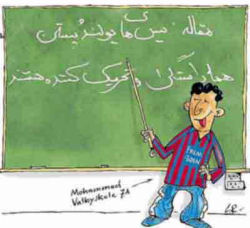Trekkie of the Month February 2006: Al-Shihan, Frankfurter Rundschau et al.
Surak Price for Logical Conflict Management
"There are conflicts, in which you can do many mistakes and hardly any right. The controversy about the cartoons of Mohammed is one of them." With these words, which could also derive from Benjamin Sisko, Stephan Hebel, editor of the newspaper Frankfurter Rundschau, opens his comment on the decision not to reprint the cartoons of the Danish colleagues of Jyllands-Posten.
 Has set the course for the newspaper Frankfurter
Rundschau in the cartoon conflict: Stephan Hebel. | |
"We have to talk to each other face to face and resolve our problems frankly. What we are seeing here is a conflict between civilizations, West and East. We must put an end to this struggle because it simply isnít good for our future. We have to rebuild these relations and to do something positive to stop what is going on. And we have to start at home."
This unexpressed alliance of the sober-minded may throw some illuminating light on the cartoon controversy. What we are seeing here is not so much the often confirmed contrast of sacred freedom of press to the interdiction in Islam to produce an image of the prophet Mohammed in a "clash of civilizations", but right-wing-conservatives and Islamist demagogues, whose enmity is connected by a strong interest in cultural separatism. Against the background of the long and mutual evolutionary history of the two monotheistic religions of Islam and Christianity - alongside Juadism, as the oldest family member - this seems especially absurd or rather it is cast into the right light.
 Fired and arrested: Jihad Momani. |
|
tion of the Planets. The Syrrannites form only one of the groups questioning the orthodox interpretation of Surak's peace philosophy, the founder of Vulcan civili-
zation, by the governing High Command. The struggles are dominated by bom-
bings and political intrigues, governmen-
tal prosecution of dissenters and the stigmatization of heretics. The social inability for balancing cooperation articu-
lates itself on the planet Vulcan in the decade of the 2150 years as well as an ideological conflict, as a question of "right faith".
Societies, which are open in relation to different ways of thinking and different ways of life, cannot be established on pure faith and stiff principles. For a successful venture of a world society established on difference and reconciliation, beliefs and principles must be put in relation to current conflicts consistently. Exactly here they must prove whether they still meet the needs of the members of such an open society, or if they require adjustments.
Both the European editorial departments, who consciously decided against a reproduction, and the editorial department of Al-Shihan with their decision to document the cartoons for the purpose of the explanation of the conflict acted in this sense. Therefore we award them the Surak price for logical conflict management. (February 14, 2006, w. & b.).
Incomplete list of Arab and European newspapers that regarded liberty of press in responsibility to liability under their respective regional context:
Aftonbladet (Sweden)
Dagens Nyheter (Sweden)
Ekstra Bladet (Denmark)
Le Figaro (France)
Frankfurter Rundschau (Germany)
Politiken (Denmark)
Al-Shihan (Jordan)
Svenska Dagbladet (Sweden)
Sydsvenskan (Sweden)
Please feel free to forward further newspaper names (including document)!
Context: Cartoons of Prophet Mohammed
After the terrorist attacks of 9/11, the military invasions in Afghanistan and Iraq, the recent aggravation of the conflict in the Middle East after the landslide victory of Hamas and the conflict about Iran's nuclear ambitions, the Mohammed cartoons published in the Danish newspaper Jyllands-Posten gave reason to escalate intercultural tensions between and inside the civil societies of Europe and the Muslim world.
 On the blackboard it says in Persian with
Arabic letters: "Jyllands-Posten's journalists are a bunch of reactionary provocateurs". | |
diction in Islam to produce an image of the prophet Moham-
med and equated the key mes-
sage of Islam with terrorism. Against the background of the racist sentiments on immigrants in Denmark, the representatives of the Danish Muslim community did not have interest in escala-
tion. Only four months after the first publication in September 2005, Islamist groups used what Jyllands-Posten had presented them on a plate, to arrange a diplomatic crisis between the Muslim East and Europe. Con-
servative newspapers like Die Welt and France Soir responded with the reproduction of these cartoons. They reasoned that it was necessary to defend the highly regarded "freedom of press" and expressed their solidarity with the Danish colleagues. Behind the high values claimed by conservative Europeans and Islamist Muslims, they - very often - conceal explicitly domestic interests:
Right-wing Jyllands-Posten is eager to enforce racism against the - mostly Muslim - immigrants in Denmark. Hamas interests in Palestine territories are about radical-sounding affirmations of its supporters after a confusing victory at the Palestine elections. Ahmadinedschads regime in Iran does not only want to distract from its sociopolitical pledges during the election campaign, which it failed to put into existence. Hisbollah fights against its own inability to transform itself into a civil political party after withdrawal of the Syrian troops from Lebanon etc.
In February 2006, Western right-wing populism and Islamist fundamentalism are as close to their common ambition to generate a "Clash of Civilizations" as never before: Even Daniel Cohn-Bendit, representative of the Green party in the European parliament and well known advocate of a multicultural society, recently affirmed the racist formula during a panel concerning the riots in the Muslim world.
Discuss the laudation at Trek Fans United -- the Trek United forum. Our posting is part of the thread Politics and Religion: Cartoon Riots, *cringe*.
Related Links:
- Stephan Hebel's commentary: Pressefreiheit im Feuer
- The interview with Jihad Momani: The Cartoons Are Silly
- Episodes on pre-federal conflicts on Vulcan:
Fusion (Season 1), Stigma (Season 2), The Forge, Awakening, Kir'Shara (all Season 4)

